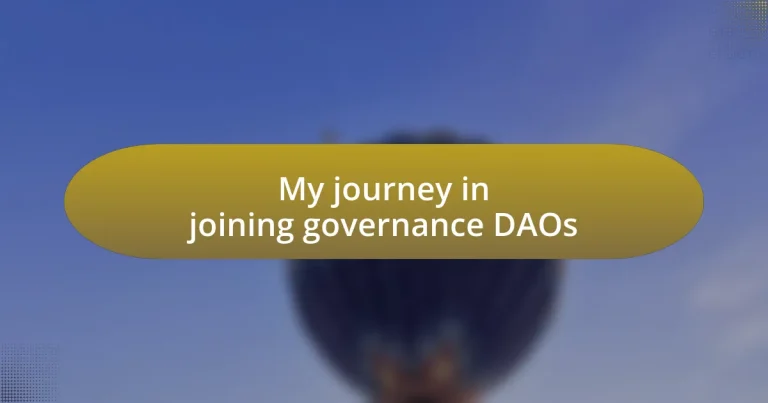Key takeaways:
- Governance DAOs empower collective decision-making by leveraging blockchain technology for transparency and inclusivity.
- Active participation in DAOs fosters trust and accountability, enhancing member engagement and community alignment.
- Overcoming challenges in communication and decision-making can lead to more effective governance and collaboration within DAOs.
- Building a network through engagement and feedback strengthens connections, promoting personal growth and community development.
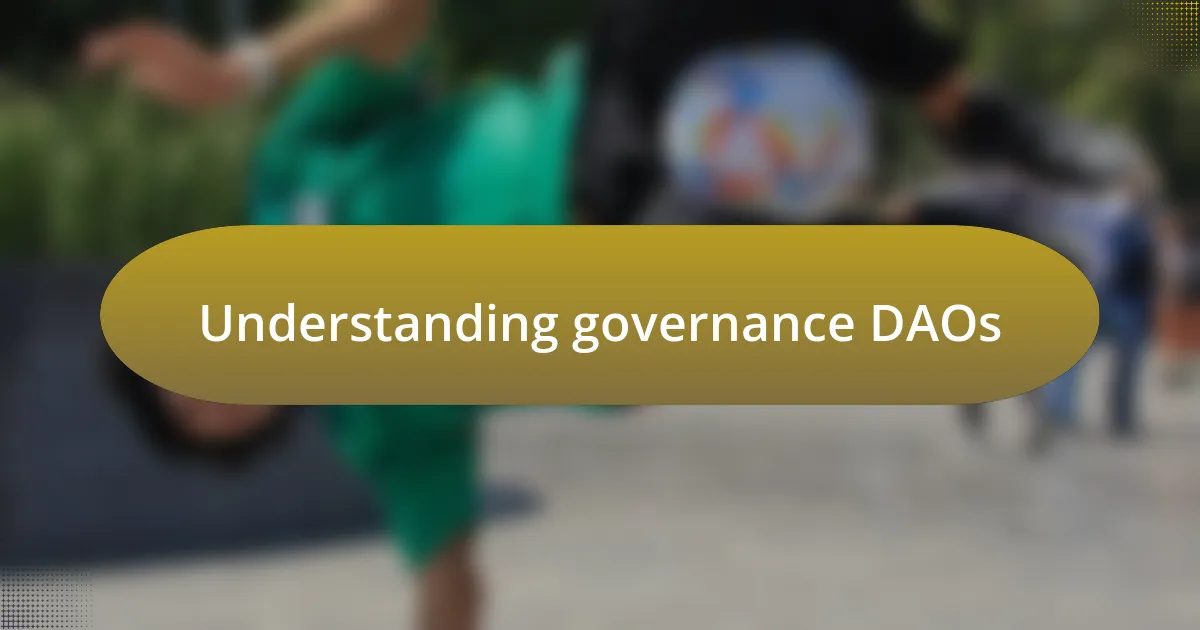
Understanding governance DAOs
Governance DAOs, or Decentralized Autonomous Organizations, represent a transformative shift in how we make decisions within communities. When I first discovered the concept, I was struck by the idea that power could be collectively distributed, allowing each member to influence outcomes. Isn’t it fascinating to think about a world where everyone’s voice truly matters?
These organizations operate on blockchain technology, which ensures transparency and fairness in decision-making. I remember participating in a vote for a community initiative where I could see firsthand how my input affected real change. It was empowering to know that I wasn’t just another number; my opinion directly influenced the direction of our community.
In governance DAOs, the rules are coded into smart contracts, giving each person a way to contribute that is both secure and democratic. Reflecting on my experiences, I can’t help but wonder how this framework might evolve traditional hierarchies. Will we continue to see more diverse viewpoints represented, or will some voices dominate the conversation? It leaves me eager to see how governance DAOs will shape the future of collaboration.
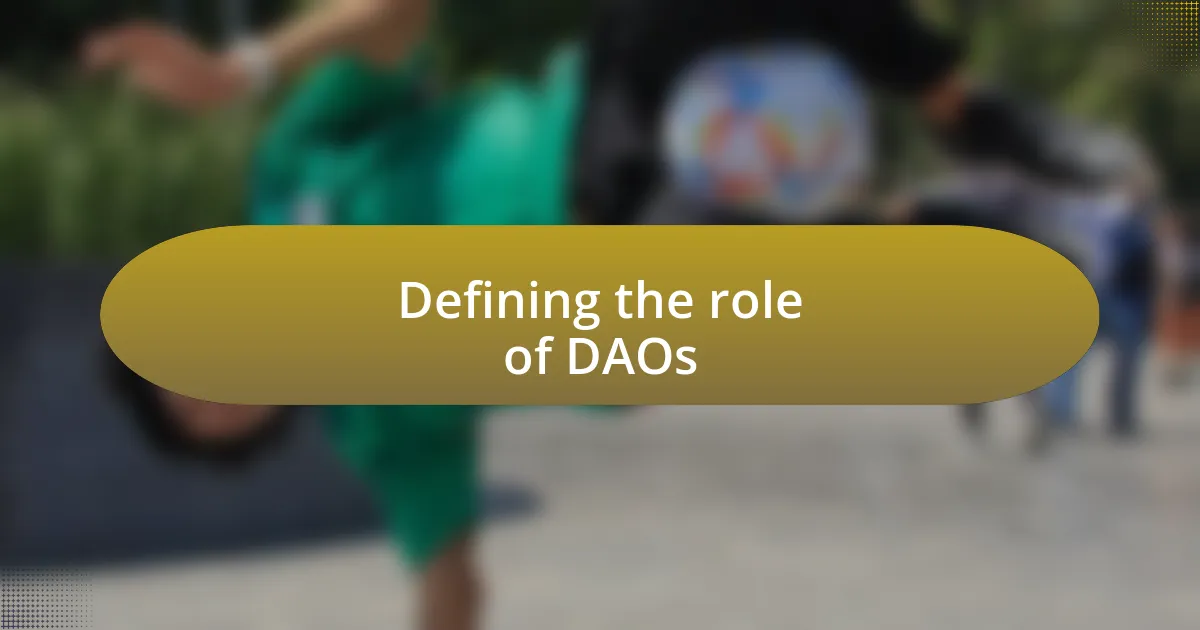
Defining the role of DAOs
DAOs play a crucial role in redefining collective governance models. They enable members to have a direct say in decision-making processes, which is something I deeply value. I remember the moment I participated in my first proposal discussion; the level of engagement and respect for differing opinions was inspiring. It made me realize that traditional governance structures often lack this kind of inclusivity.
Additionally, DAOs foster a sense of community by leveraging blockchain technology for transparency. This was evident when I voted on a funding allocation for a community project. I could track the entire process, from proposal to execution, which built trust and accountability among members. Such a transparent environment encourages active participation, making individuals feel their contributions are meaningful.
Moreover, governance in these organizations hinges on smart contracts, which automate the execution of agreed-upon rules. This automated aspect resonates with me, as it minimizes the potential for conflicts. I recall a heated discussion over a proposal where emotions ran high, but our collective faith in the smart contract process kept the atmosphere constructive. It highlights how DAOs can mitigate human biases, making for a more level playing field.
| Feature | Traditional Governance | Governance DAOs |
|---|---|---|
| Decision-Making Process | Top-down | Collective and inclusive |
| Transparency | Limited visibility | Full transparency via blockchain |
| Execution of Rules | Subject to interpretation | Automated via smart contracts |
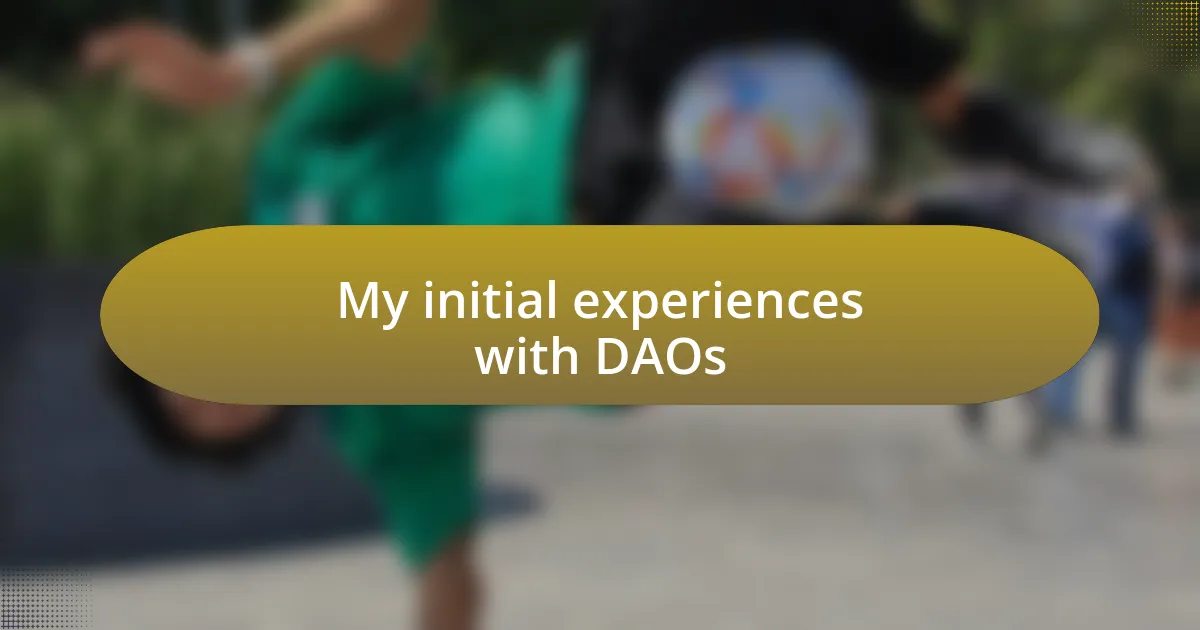
My initial experiences with DAOs
My initial experience with DAOs was a blend of excitement and uncertainty. The first time I joined a discussion forum, I felt both eager and intimidated. So many knowledgeable voices were sharing their insights, and I found myself learning just by listening. It was eye-opening to witness how collaborative efforts could lead to innovative solutions, and for the first time, I felt I was part of something bigger.
- I discovered the power of voting dynamics and how they differ from traditional models.
- Observing seasoned members advocate for their proposals helped me understand the importance of communication skills.
- I experienced the collaborative spirit firsthand, which reassured me that my voice mattered, no matter how new I was to the field.
During this early stage, I also faced some challenges. Navigating through technical jargon was overwhelming at first, but I sought advice and learned quickly. The community’s willingness to help newcomers was heartening. I remember a particular moment when a member patiently walked me through a complex proposal, ensuring I understood every detail. That genuine support fueled my passion for participating more actively in DAO governance.
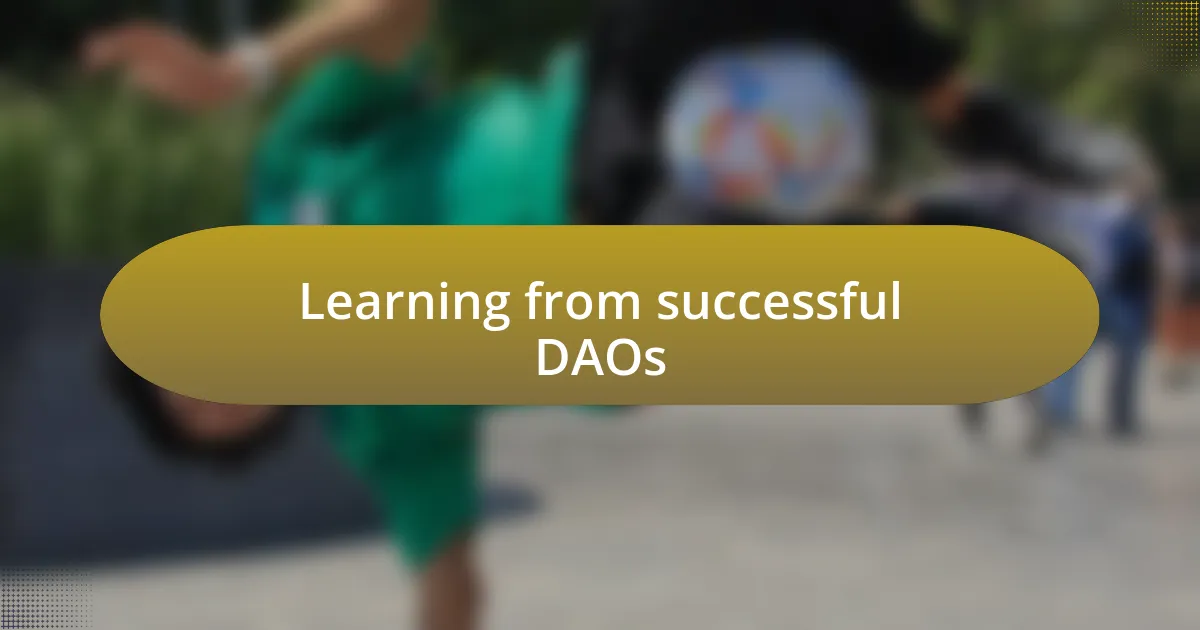
Learning from successful DAOs
Learning from successful DAOs has been a pivotal part of my journey. One DAO, in particular, caught my attention for its transparency and member inclusion. I remember attending their weekly meetings, where they openly discussed challenges and strategies. It struck me how such an environment fostered trust and motivated members to participate actively. Have you ever felt how powerful open dialogue can be in a group setting? I certainly found clarity and direction through those candid discussions.
Observing the decision-making processes of established DAOs taught me invaluable lessons. I noticed that successful proposals often included thorough research and community input, which made me reflect on how I could enhance my own contributions. I vividly recall debating a proposal that emphasized sustainability; the diverse perspectives shared transformed my understanding of the topic. Engaging with different viewpoints opened my eyes to the importance of inclusivity—this is essential for driving meaningful change.
Furthermore, the emphasis on education within successful DAOs inspired me immensely. Many of them host workshops and create resource hubs for their members. I participated in a financial literacy session and felt empowered knowing that everyone had equal opportunities to learn and contribute. It made me ponder: how can we replicate this knowledge-sharing model in less established DAOs? The answer lies in fostering a culture of learning, something I aim to advocate for in my future DAO engagements.
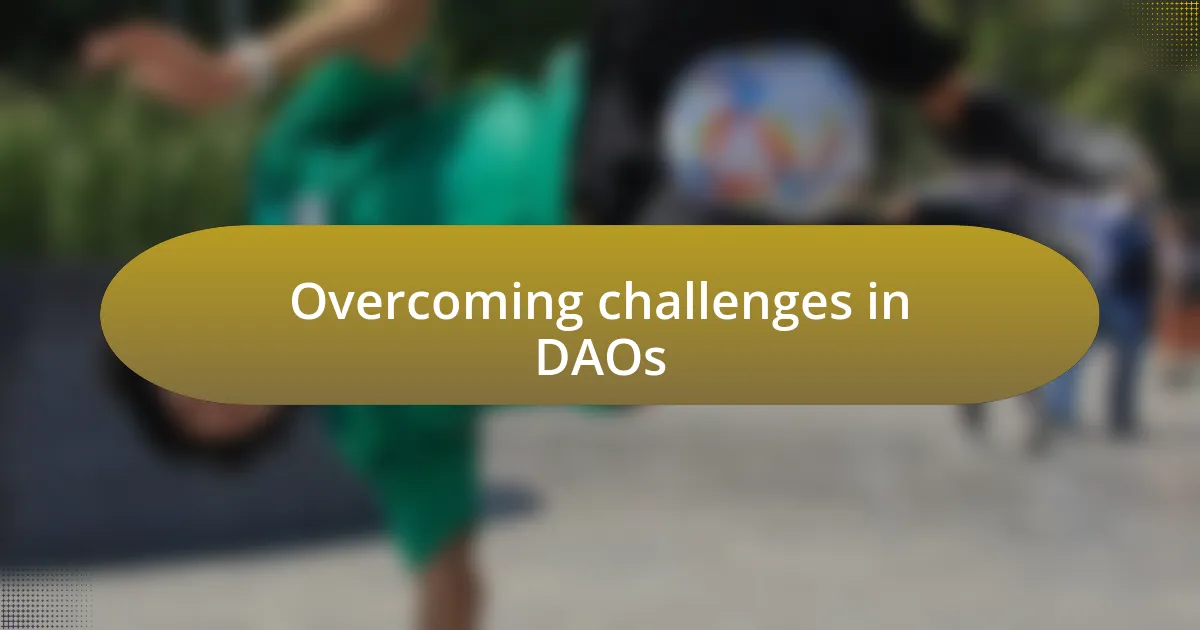
Overcoming challenges in DAOs
Navigating the challenges within DAOs has been quite a journey for me. One major hurdle I encountered was the overwhelming amount of information and differing opinions during discussions. I vividly remember a heated debate over a proposal where the clarity seemed lost amidst the noise. It made me realize the importance of summarization and thoughtful moderation. Have you ever felt like you were drowning in too many perspectives? Finding strategies to distill the key points helped not only me but also others regain focus and clarity.
Another challenge I faced was aligning member motivations with the overarching goals of the DAO. In one instance, I noticed that while many were passionate about the mission, their individual interests varied widely. I took it upon myself to facilitate a workshop, exploring how personal goals could align with our collective vision. Seeing members connect their aspirations to the DAO’s objectives was truly rewarding. It led me to reflect: how often do we address individual motivations in a community setting? Helping others recognize the intersection of their ambitions and the DAO’s mission created a sense of unity.
Lastly, overcoming the occasional inertia in decision-making became a crucial part of my experience. I’ve been there, feeling stuck when consensus seems elusive. Once, during a crucial vote, I suggested taking a short break for reflection. This simple step allowed everyone to gather their thoughts and return with renewed focus and energy. How effective can a little pause be in achieving clarity? This taught me that sometimes, a moment of silence can pave the way for the most productive discussions. It’s fascinating how small adjustments can lead to significant progress in governance.
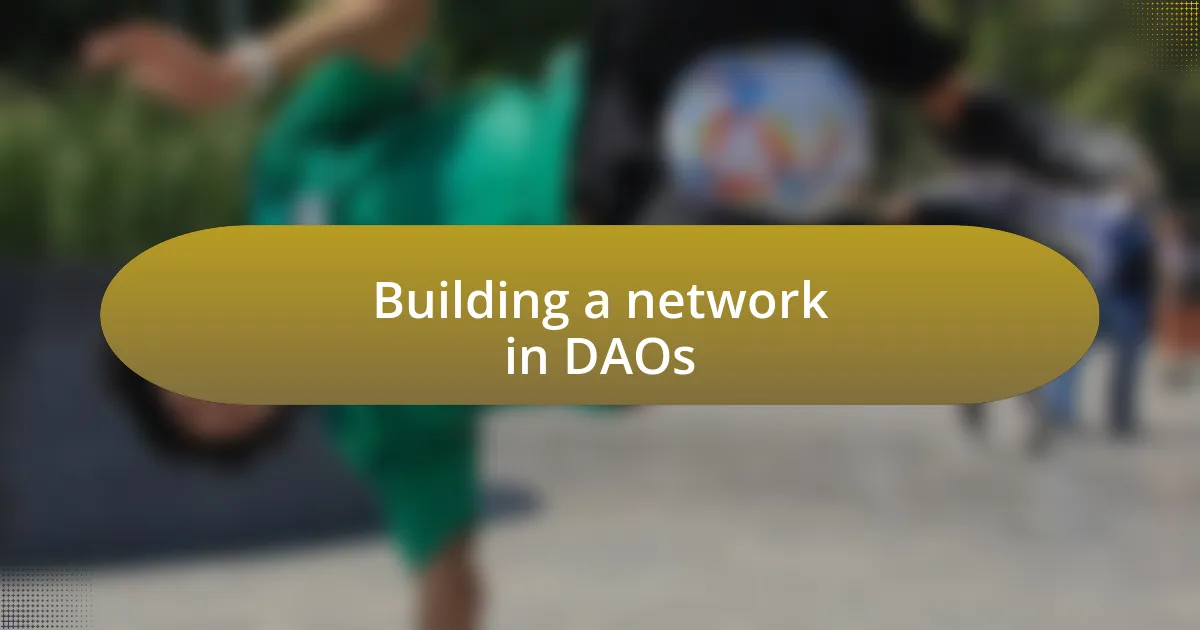
Building a network in DAOs
Building a network within DAOs is both exhilarating and daunting. When I first dipped my toes in this space, I was surprised by how crucial personal connections were in fostering collaboration. I remember attending my first virtual meet-up, feeling a blend of excitement and nervousness. It was incredible to see how shared experiences allowed strangers to quickly bond, creating a foundation for future projects and discussions. Have you ever noticed how one meaningful conversation can spark a whole new path?
As I engaged more deeply with different communities, I realized leveraging social media platforms was essential for building my network. I began sharing insights from my own experiences and the responses I received were eye-opening. Suddenly, I wasn’t just a passive observer; I was part of a dialogue. Engaging with others through comments and direct messages helped me form lasting relationships and fostered a sense of belonging. Wasn’t it refreshing to see how quickly genuine connections can be forged online?
Additionally, I found that participating in collaborative projects significantly enhanced my network. For example, I joined a subgroup focusing on governance best practices and shared my thoughts on improving member engagement strategies. The feedback and ideas I received were invaluable, and not only did I gain new friends, but I also learned a great deal from their diverse perspectives. Isn’t it fascinating how collaboration can turn acquaintances into lifelong allies?
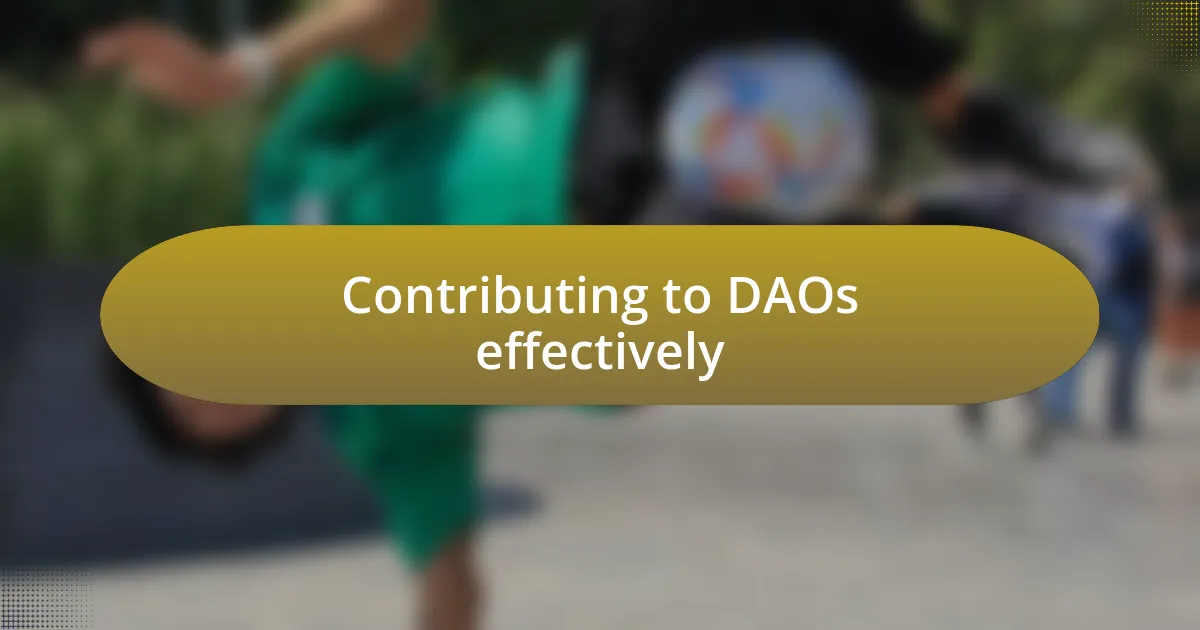
Contributing to DAOs effectively
Contributing effectively to DAOs requires a proactive mindset. I learned this firsthand when I took the initiative to propose a new way for our community to handle project feedback. It was nerve-wracking to put my ideas out there, but when the team embraced my suggestion, I felt an incredible sense of empowerment. Have you ever experienced that moment when your voice not only gets heard, but also makes a tangible impact? It solidified my belief in the value of sharing insights, no matter how small they may seem.
As I continued my journey, I realized that clarity in communication is paramount. In one instance, while drafting a proposal for a new initiative, I spent time ensuring my ideas were articulated clearly and concisely. By breaking down complex concepts into digestible points, I engaged more members in the discussion. Have you considered how simplifying your thoughts can enhance the dialogue? It truly helped transform my contributions from mere suggestions into actionable plans.
Embracing feedback became another cornerstone of my effectiveness in DAOs. I distinctly remember a time when a peer critiqued my approach to community engagement. Initially, I felt defensive, but as I reflected on their input, I recognized the opportunity for growth. It’s a delicate balance, isn’t it? Accepting feedback takes courage, but it ultimately builds a stronger foundation for collaboration, and I’ve since welcomed constructive criticism as a vital part of my contributions.

